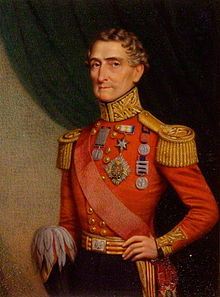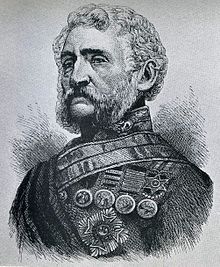Harry Smith, 1st Baronet
Sir Henry George Wakelyn Smith, 1st Baronet , GCB (born June 28, 1787 in Whittlesey , Cambridgeshire , † October 12, 1860 in London ), commonly known as Sir Harry Smith , was a well-known British Army officer of the early 19th century. Among other things, he took part in the First Sikh War .
Early years
Smith was born June 28, 1787, the fifth of thirteen children to a surgeon in Whittlesey. He joined a yeomanry (a cavalry regiment made up of volunteers), but soon switched to the 95th Foot as an ensign and then to the Rifle Brigade. On August 15, 1805 he was promoted to lieutenant.
Napoleonic Wars
In 1807 Harry Smith was sent to South America and participated in the capture of Montevideo and the attack on Buenos Aires . In December 1807 he returned to Great Britain. On October 26th, he landed in Spain and took part in the Battle of La Coruña . He then returned to England, but landed back in Lisbon in May 1809 . On July 24, 1810, he was wounded in a battle near Coa. In March 1811 he commanded a company and took part in skirmishes at Redinha, Condeixa and Foz d'Arcone. As a brigade major, he fought at Sabugal, Fuentes de Onoro and the storming of Ciudad Rodrigo.
On February 28, 1812, Smith was promoted to captain. On April 6th, he took part in the storming of Badajoz . There he met 14-year-old Juana María de los Dolores de León Smith and married her a few days later. From then on, his wife accompanied him on all campaigns except the one in America. The marriage remained childless.
On July 22, 1812 he fought in the Battle of Salamanca , on June 21, 1813 in the Battle of Vitoria , on March 20, 1814 at the Battle of Tarbes and on April 10 in the Battle of Toulouse .
He took part in the British-American War as Assistant Adjutant-General and fought in the Battle of Bladensburg and was there in the conquest and burning of Washington . On September 29, 1814, he was promoted to Brevet Major. At the Battle of New Orleans, he negotiated a two-day truce. On February 11, 1815, he accepted the surrender of Fort Bowyers at Mobile. The news of the peace in Ghent ended the war.
Smith reached England during Napoleon Bonaparte's reign of the Hundred Days and participated in the Battle of Waterloo as Assistant Quartermaster General in the 6th Division of Wellingtons . With effect from June 18, 1815, he was appointed lieutenant colonel. During the occupation of France , he was mayor of Cambrai .
In 1818 Harry Smith returned to Great Britain. Uses in Shorncliffe , Gosport , Glasgow and Nova Scotia followed . On November 23, he became deputy quartermaster general in Jamaica . Under Governor Galbraith Lowry Cole he served in the same occupation from the summer of 1828 at the Cape of Good Hope .
In the Sixth Xhosa War , Benjamin D'Urban appointed Smith second in command, and both took part in battles against the Xhosa .
India
On January 10, 1837, Smith was appointed Brevet Colonel, and on March 6, 1840, he was appointed Adjutant General of the Army in India. In this capacity he took part in the Gwalior campaign in December 1840 and the Battle of Maharajpur on December 29, 1840 under the command of Hugh Gough .
When the First Sikh War broke out in December 1845, Smith was given the honorary rank of major general and command of a division. Here he took part in the Battle of Mudki on December 18 and the Battle of Ferozeshah on December 21/22. December part. On January 28, 1846, the Battle of Aliwal took place, in which Smith and his troops captured 60 enemy artillery and the enemy camp and put the Sikhs to flight. Smith also took part in the Battle of Sobraon , the final battle of the war. He was promoted to major general in the army of the British East India Company and raised to the baronet of Aliwal. On November 9, 1846, he was appointed major general in the British Army . In 1847 the University of Cambridge made him an honorary doctorate in law.
South Africa
On September 3, 1847 Harry Smith became governor of the Cape of Good Hope and expanded the Cape Colony to the Orange and Keiskamma Rivers . A proclamation by Smith, which extended the Cape Colony again, this time to the area between Vaal and Oranje, was rejected by Boer leader Andries Pretorius . Pretorius raised a Boer force and occupied Bloemfontein . On August 29, 1848, at the Battle of Boomplaats , Smith met and defeated the 1000-strong, well-entrenched Boer force. Some of the Boers moved with Pretorius over the Vaal and helped found the Transvaal there .
Between 1848 and 1849 the British government's plans to establish a penal colony in Cape Town caused great excitement among the local population. Smith resisted them with the Colonial Secretary Henry Gray and was able to avert them completely in February 1850.
In 1851 the Eighth Xhosa War broke out. On April 7, 1852, Smith was replaced by George Cathcart , as the British government was not satisfied with his progress in the fight against the Xhosa. He was employed as a commander of the Western and Northern Military Districts and was promoted to lieutenant general on June 20, 1854.
On October 12, 1860, Smith died of angina pectoris in his London home on Eaton Place West. His grave is in his hometown of Whittlesey.
The cities of Harrismith and Smithfield in South Africa were named after him.
Orders and decorations
- Waterloo Medal
- Peninsula Medal with twelve clips
- Gwalior Star
- Sutlej Medal
- Knight Grand Cross of the Order of the Bath
literature
- Harry Smith: Autobiography. J. Murray, London 1901.
- Sir John Kincaid: Adventures in the rifle brigade in the Peninsula, France and the Netherlands from 1809-1815. London 1830.
- Joseph H. Lehmann: Remember you are an Englishman. A Biography of Sir Harry Smith, 1787-1860. Jonathan Cape, London 1977.
- Georgette Heyer: The Spanish Bride. dtv 1998. ISBN 342320155X . The novel is based on the autobiography of Sir Harry Smith.
Web links
- Harry Smith: Autobiography , from the University of Pennsylvania Digital Library Project.
| personal data | |
|---|---|
| SURNAME | Smith, Harry, 1st Baronet |
| ALTERNATIVE NAMES | Smith, Sir Harry; Smith, Henry George Wakelyn |
| BRIEF DESCRIPTION | British Army Officer |
| DATE OF BIRTH | June 28, 1787 |
| PLACE OF BIRTH | Whittlesey |
| DATE OF DEATH | October 12, 1860 |
| Place of death | London |



